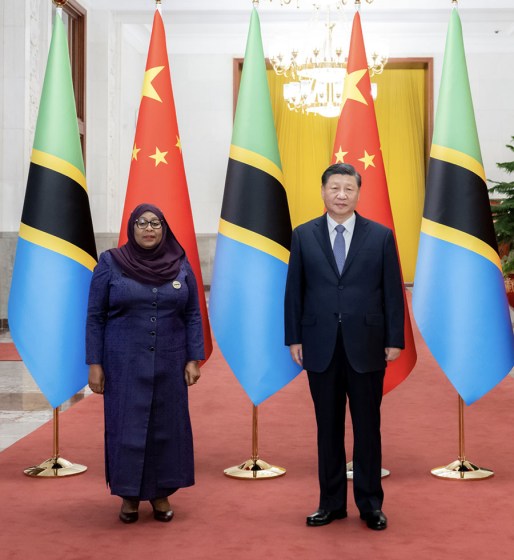China Turning Some Belt & Road Loans Into Non-Refundable Grants
Tanzanian President Visits Beijing, Negotiates Loans Into Grants And Signs Off Additional Infrastructure Deals
By Chris Devonshire-Ellis
The overlooked, but important recent visit of the Tanzanian President, Samia Suluhu Hassan to Beijing on Thursday (November 3) has given clues as to how China intends to deal with at least some of the debts it has accrued due to errant BRI loans being overdue.
Meeting with Chinese President Xi Jinping, Hassan was able to negotiate 15 new agreements with China, including the provision of a US$13.7 million grant, under the title of ‘Economic & Technical Cooperation’. This writes off, as a grant, an earlier loan China had made to Tanzania.

Tanzanian President, Samia Suluhu Hassan, with China’s Xi Jinping
Tanzania had found itself in the red with China after the building of a railway and other infrastructure to the countries Bagamoyo Port had been seriously affected in terms of projected cash-flow generation during the Covid pandemic. Planned for income derived from freight and other taxable services did not materialize, leaving Tanzania scrambling to finance debt. China has cancelled part of that by moving it from China’s ‘account receivables’ ledger to its ‘expenditures’ ledger by re-categorizing the amount.
The experience has made the two countries closer – the Bagamoyo Port will in time prove productive anyway, while China’s trade with Tanzania grew by 47.1% in 2021 to reach US$6.74 billion – with the bulk of that being in China’s favour. That means that China’s exports to Tanzania increased by nearly US$3 billion over the year – the US$13.7 million being a refund ‘reward’ against China’s exporters doing well, and a sign that China is prepared to cancel loans due if trade grows, a neat way of solving sovereign debt problems.
Xi didn’t have it all his own way, however. In return, and to encourage Tanzanian exports to China, the Chinese Ministry of Customs has agreed to cancel 98% of all China tariffs on Tanzanian imported products – a major prize for Tanzanian exporters. The country exports oil seed crops, raw and refined copper to China and will be looking at other export items to send to Chinese consumers.
Hassan was also able to point to a recovering Tanzanian economy as a type of assurance that the country was able to negotiate more debt with China once the early one had been converted. The Tanzanian economy is valued at about US$68 billion and is experiencing 4-5% GDP growth thus far in 2022.
To that end, the two countries signed an additional loan of US$56.72 million to develop Tanzania’s avocado and marine sanitary and quality control infrastructures, as well as partial financing for the Zanzibar International Airport second terminal project.
Tanzania and China also signed off a ‘Comprehensive Strategic Co-Operative Partnership’, a significant document that upgrades their ties. Kenya, to the south of Tanzania is the only other East African nation to have such an agreement.
The understanding of how national economic problems have arisen, while examining the underlying economic fundamentals and their future value to China trade are therefore key to understanding how China views debt forgiveness as concerns the BRI loans.
There are differences however. Many of the sort of loans Tanzania has experienced are shorter-term cash-flow related problems due to Covid, while others, such as the situation in Sri Lanka, have been created by mismanagement and local corruption. That category will require refinancing, as opposed to the smaller variety seen in Tanzania where millions can be forgiven under the auspices of a trade volume discount.
Related Reading





